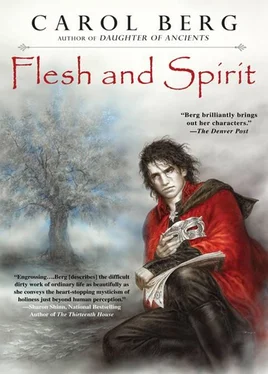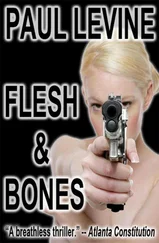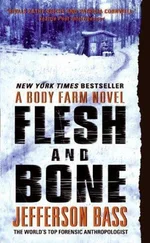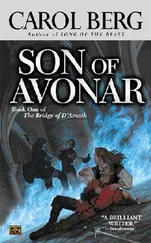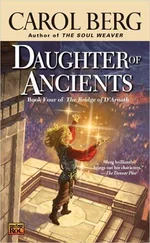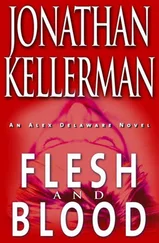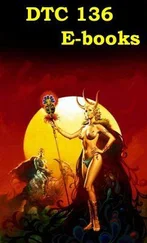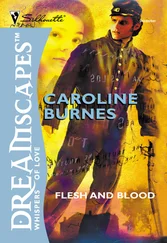Ah, Gram—the mournful fellow who’d consulted me about the maps. He’d had an unhealthy cast to his skin. A lord’s secretary.
The loaf was chewy where it should be and tender everywhere else, and the soft cheese tasted of almonds. Unflinching, I ate every morsel of both and buried my disturbance in the homely comforts of a well-run kitchen. Jerome and his minions, as with all who worked in kitchens and brew-houses, wielded power I understood.
Brother Gildas and I bade the kitchen staff farewell and trudged slowly past the lay brother’s reach in a light rain. I felt almost myself again. Likely Brother Gildas’s estimate of my collapse had been right, naught but hunger and healing. I’d had little experience of common sickness.
“Gillarine seems a vastly holy place,” I said. Healthy grain, plump vegetables, untainted sheep, spirits in its garth…I doubted any house in Navronne could boast such bounty.
“Many in our brotherhood have found it so. I have discovered my own destiny here—against every expectation of my life.”
His words left an offer hanging in the air, something more generous than tavern friendships. More honest. I was gratified, and a bit astonished, at such trust. But if I probed deeper, he would rightly expect to do the same. And that could not happen. Of all the protections I had built over the years, the surest was to keep my secrets close.
Fumbling about for a new topic, I hobbled across a cart track that led from the lay brothers’ reach southward along the Kay. The view of the wide, shallow river and the mist-shrouded valley, bound by forested ridges and the high mountains far to the south, recalled Jullian’s odd tidbit. “Tell me, Brother, why would anyone be building a lighthouse so far from the sea?”
Even the broad River Yaronal that separated the kingdom from the brutish herdsmen to the east could be no nearer than two hundred fifty quellae, and likely unnavigable at that nearest point. Indeed, I wasn’t certain people built lighthouses on rivers, much less in green vales like these.
My inquiry, posed in all innocence, halted Brother Gildas in midstride. “Who spoke to you of a lighthouse?”
One never reveals one’s sources when queried with such severity. “Mmm…I don’t recall. So many people come in and out of the infirmary.”
After a moment, he smiled and nudged me onward. “Well, of course, you haven’t yet seen the church windows on a day when the sun shines, else you’d grasp the reference. Come now, tell me more of Palinur.”
A nice recovery, but I didn’t believe him in the slightest.
As we crested a slight rise between the cart track and the infirmary garth, a cloaked horseman barreled up the track through the increasing drizzle, passing just behind us. He vanished in the cluster of buildings behind the lay brothers’ reach.
Brother Gildas halted again, glancing after the rider and then to the infirmary, squatting peacefully with its back to the river. “Can you make it the rest of the way on your own, Valen? The hour is Sext, and I’ve duties before prayers.”
“Certainly. The air has done me good. I was beginning to feel like a sheep in a pen, shut up in that infirmary.”
With an admonition to inform Brother Badger of my weakness at the cloister garth, Gildas hurried off, not in the straightest path to the church, but in the same direction as the rider, soon lost to sight as well. A departure as enigmatic as his excuse. No bells had rung for the holy Hour. This place seemed to nurture mysteries: lighthouses, savage murders, an intelligent abbot who welcomed vagabonds like me, and a spirit in the cloister garth who did not.
Monastery life moved slowly, so I understood. Though abbots might be required to heed the winds of politics, their flocks of holy brothers sat outside of the stream of time and events, wrapped up in scholarship that spanned centuries and prayer and contemplation that spanned the boundaries of earth and heaven. So why, of a sudden, did I feel as if I were being rushed down a dark alley by a gang of smiling jacklegs who would pick my pockets and plant a shiv in my spleen before dawn? I hobbled quickly toward the infirmary.
Vesper bells clanged and hammered. The monks were gone to prayers again, the lingering draft from their departure my only company in the quiet infirmary. Robierre had left me a brimming posset, dosed with extra honey in apology for sending me out walking too strenuously.
In truth my leg felt better recovered from the day’s adventure than my spirit. I could not shake my thoughts free of the murdered monk. Had this Horach truly made himself known to me? Surely of all residents of this abbey, I knew the least that might ease a tormented soul. But a man left himself open to mortal peril did he ignore the demands of the dead.
My fingers traced the smooth curves of the turned wood mug. The bells fell silent. The monks would go to supper after prayers, which meant near two hours alone here with naught to think of but a youth left in agony to bleed, unable to cry for help.
Before I knew it, I’d thrown my damp gown over my dry shirt, pulled my boots over my bare feet, and retrieved my walking stick. Guided by the church towers and wafting smoke that smelled pleasantly of onion and garlic, I limped across the infirmary garth and through the puddled passage between the kitchen and refectory, retracing our path of the morning. Pigeons’ cooing and the fading echoes of plainsong accompanied me into the deserted cloisters. Thick clouds had stolen the early-evening light.
I shivered. Saint Gillare’s wingless angels gleamed pure white against the dusk. The chill air, heavy with moisture, clung to skin like mud and smelled of rich earth and green grass. To retreat felt stupid and cowardly, yet now I was here, I couldn’t steel myself to step wholly into the garth. My hand squeezed the smoothed knob of the walking stick. There were other ways to approach uncertain ground than just blundering in.
Though I had denied it for years, adamantly avoiding occupation as a scout or guide as if to prove that denial, I had inherited the familial bent for route finding and tracking. My Cartamandua bloodlines were well documented, of course, enshrined in the Registry in Palinur before my birth and witnessed on the day I took my first breath. I’d always felt like a prized cow, bred to supply Navronne with the cream of sorcery.
I wandered down the south cloister, past the kitchen wall and around the corner into the walk that fronted the lay brothers’ reach. Dared I release magic here? Whether I used it in formulated spellwork or to trigger my family bent, it would leave traces, detectable by a Registry inspector. Or perhaps an abbey sanctified to Iero, its Rule forbidding use of magic, might be warded to prevent spellcasting and give off noises or explosions if I breached its protections. Every instinct said not to risk it, but then again, my instincts were unused to the requests of unquiet spirits.
I tossed some of Robierre’s stock of bergamot onto the grass that young Horach might use it for the Ferryman’s tally, apologizing that I’d naught better to offer. Then, clutching my walking stick, I eased myself to kneeling. Crouched at the verge of the west cloister, some halfway down its length toward its meeting point with the church, I laid my palms on the cool wet grass, shaped my intent, and released just a spit of magic.
My limited experience of such trials led me to expect an image of the square to resolve itself in my mind: the grass and stones, the shrine, the bounding columns and walkways, the size, shape, and source of the font. Not a visual image, but more of an understanding of structure, composition, direction, and history, and if I was fortunate, a sense of what obstacles, spells, or spirits might lie here. But the sensations confounded all expectations.
Читать дальше
